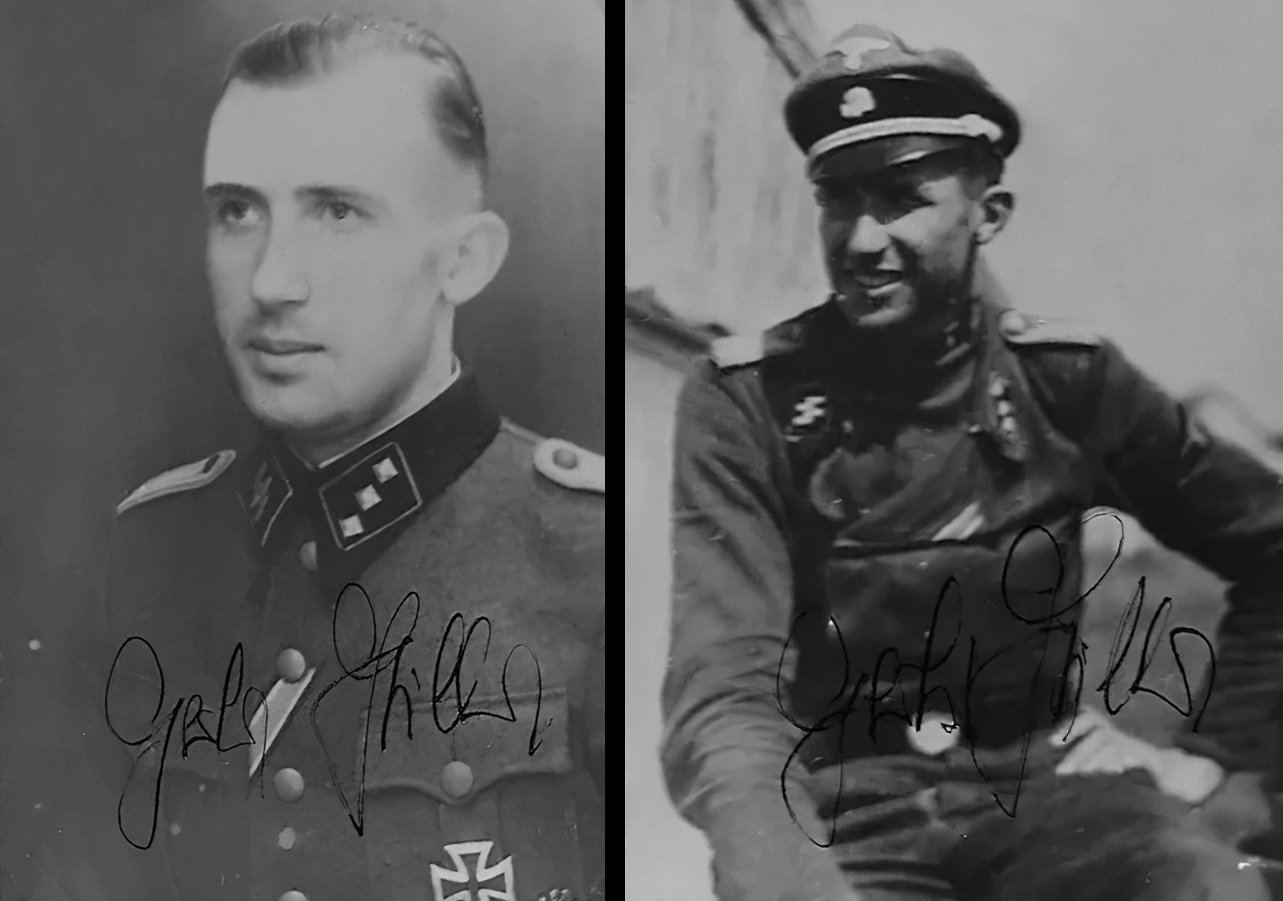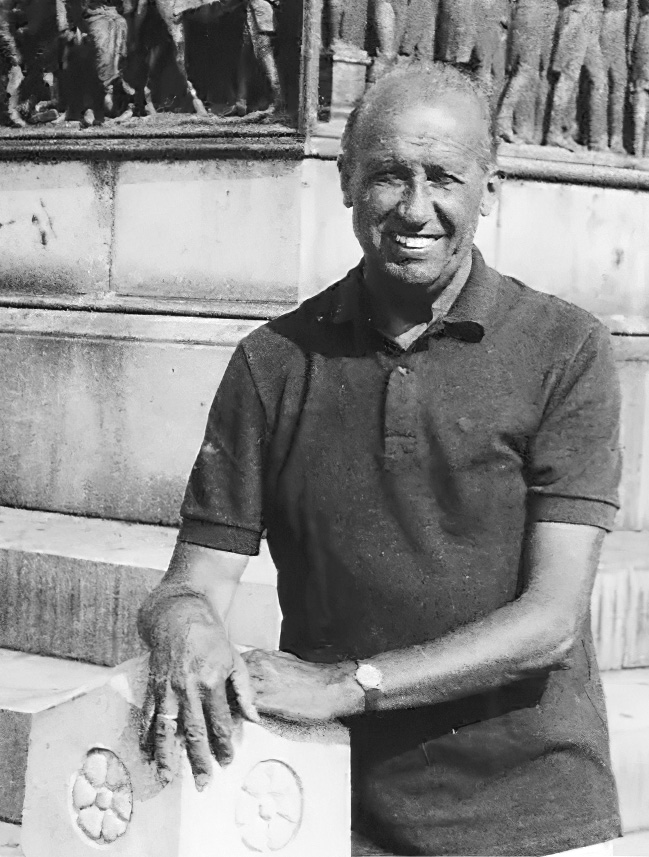
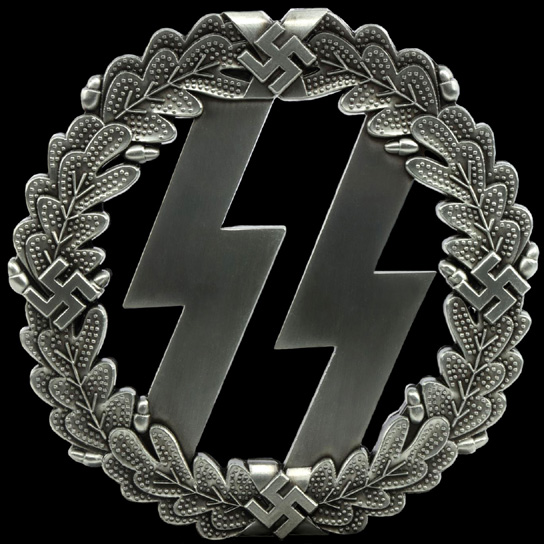
Interview with SS Untersturmführer Gerhard Stiller, a combat medic from the elite 1st SS Panzer Division Leibstandarte SS Adolf Hitler [LSSAH], later a Panzer instructor, Paderborn, Germany, 1989.
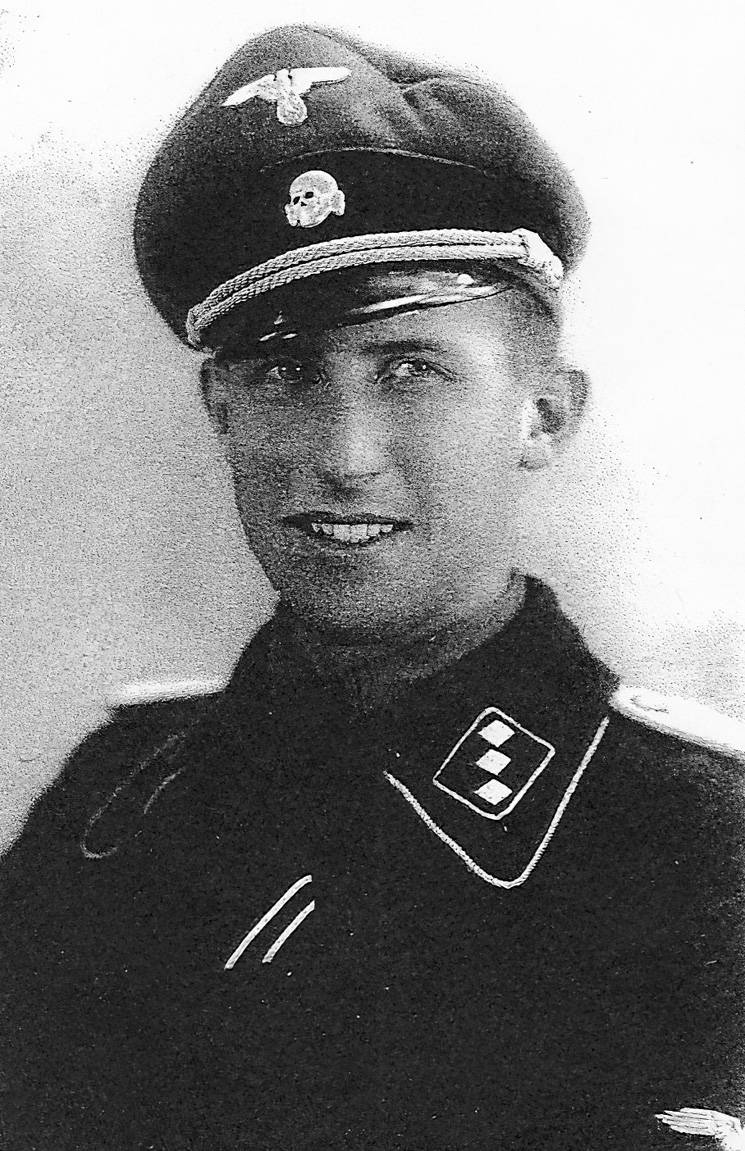



Interview with SS Untersturmführer Gerhard Stiller, a combat medic from the elite 1st SS Panzer Division Leibstandarte SS Adolf Hitler [LSSAH], later a Panzer instructor, Paderborn, Germany, 1989.


Gerhard: Yes, for me the SS was the natural choice, as I was in the Hitler Youth since 1933. It was ingrained upon us to serve Germany as soldiers; it was the law then as now. When war broke out in 1939 I was about finished with school and in 1940 decided to volunteer for the SS.
I was allowed to start the entrance exams, and passed them all; it was still hard to enter the SS at this time. The main point of my decision must have been in 1940, we had a group of SS men come speak to us about how the SS would let us fulfill our duty to Germany and the National Socialist state. I knew then I wanted to be a part of the nation's elite.
Things were different back then, it was not a bad thing to be a National Socialist and in the SS, both were held in high esteem by the people. The party had done its part in showing that this new ideal was working for the people and they supported it almost to the person. Of course after the war it was a different story, the victors forced everyone to turn on National Socialism and anyone who was a party member.
What was your training like in the Waffen-SS?
Gerhard: In 1940 there was a heavy emphasis still placed on marching and spit and polish. We had to look good and carry ourselves as bodyguards of the movement. I remember we had higher up generals and party leaders talk to us, as the war was new. They stressed how important this fight was to Germany's existence, and that we fight with courage and honor.
The war was going well, we had beaten France, had Britain on the ropes, and you would never know Germany was at war. In Berlin it was as in peacetime. Clubs, restaurants, hotels, theater, fairs, and shows were going on like before. We called this time the phony war. Some cities had been bombed, Berlin also, but not with severe damage.
My basic training was in Posen and was very hard. We had to rise very early, our dorm was inspected then we set off to drill. We would eat, then drill some more. We had inspections everyday it seemed. Our instructors were combat veterans from Poland and the West.
They were hard on us but fair, I remember them preaching that attention to the little things will keep you alive, and your comrade next to you is your bodyguard. We trained during the winter months which were not comfortable at all. There is nothing like crawling in muddy fields with it hardly above freezing.
We also had weapons training on the K98 [Karabiner 98], MG 08 [Maschinengewehr 08] and the MG 34 [Maschinengewehr 34], plus Czech weapons as well. Once my training was completed I was assigned to Lichterfelde and assigned as a guard to the Reich Chancellery. This was a very big honor for such a young recruit, and was the final step in my training.
Did you ever meet Hitler or Himmler?
Gerhard: Oh yes, I was only there for a few short months, but the Führer was present and would greet us. He always saluted us as he entered or while greeting a head of state or dignitary. I remember him very fondly, he knew us by name and remembered birthdays and anniversaries. He was a leader, yet one of the common people.
I remember Reichsführer-SS Himmler the same way, while I was at Lichterfelde he visited once for a lunch and dinner hosted in his honor. Many leaders and generals were with him in attendance I remember. He gave a short speech in which he hinted that war would soon break in the east against Jewish Bolshevism.
In Europe at that time there was great fear of the Soviet Union, like today. They had been taking land in Europe and threatened a worldwide revolution. Finland, Poland, the Baltic States, and Romania all had to cede to Russia. Today they claim it was to protect them from Germany, but the victor gets to write history.
I was back then, as I still am today, convinced Stalin was going to attack us to take the west for Bolshevism. Himmler was speaking in this way, that Europe must survive the onslaught of this plague created by Jews. He said this was the greatest threat our race has ever known, and if not stopped it will destroy the moral basis of western man.
He was very smart to be able to see this, and raise the forces to fight it. It was because of this I asked to join the LSSAH in a combat medic role, and was granted my request. I was on duty when the Führer left for the east; he gave one last greeting to me that day. I was then also off to join the unit in preparation for what would become Barbarossa.
What was fighting like in the beginning of the invasion of Russia?
Gerhard: First off I was sent to Czechoslovakia in May 1941, but as soon as I arrived the new division Adolf Hitler was ordered into Poland. We received a warm welcome from the civilians, who came out to greet us as we entered into our billets.
One mother was heard to say that the town needed to lock up their daughters as the men were very handsome from Hitler's bodyguard. This was true, as no sooner did we get settled in than the girls came out to watch our drills and maneuvers. I was with the motorcycle recon and became lost once and a very pretty Polish girl kindly guided me back.
We trained with the new units that came to us, and by June 21st we were mostly at division strength, but still had problems with supply and equipment. However, the war did not wait and we attacked Russia and the LSSAH was soon part of the fighting.
I remember the Russian soldier was tough and tenacious. He had to be respected to be defeated. It is not true we thought of them as worthless animals, they were soldiers just like us, and we were told to respect them or they would defeat us.
I was a medic and treated many wounded Russian soldiers and the civilians who were unlucky to get caught up in the fighting. I remember the Russians burned everything when they retreated. They killed animals, poisoned water with oil, destroyed trains, even destroyed whole towns and cities to deprive us of shelter. It also left us to take care of the populations.
I saw our Red Cross and welfare organizations come in to help them later on. We did not treat them badly or think of them as inferior as they say now. Seeing the crimes some of the Russian soldiers committed hardened us, it made us become immune to emotions later on. But we did our best to treat them well and to make a good impression.
The Russians would defend their lines with savage tenacity, not yielding until they were out of the fight. They were known for playing dead, then firing on us from behind, I lost a comrade like this. He was shot in the back by a wounded soldier. It taught us to be very vigilant and to guard each direction.
I was badly wounded in August right outside a German settlement that had been ravaged by fanatic Bolsheviks. We came to liberate them, but the fighting was severe and many had been shot down. I was taken from the field and given good care by Ukrainian nurses, and then sent back to Germany.
I was then selected for training in the tank regiment of the LSSAH but fate called me to better endeavors. I was also selected to attend the officers training at Braunschweig and entered into this wartime class.
[Above: Chivalry was an SS ideal. Here a Waffen-SS soldier gives water to his wounded enemy, a Russian soldier.]
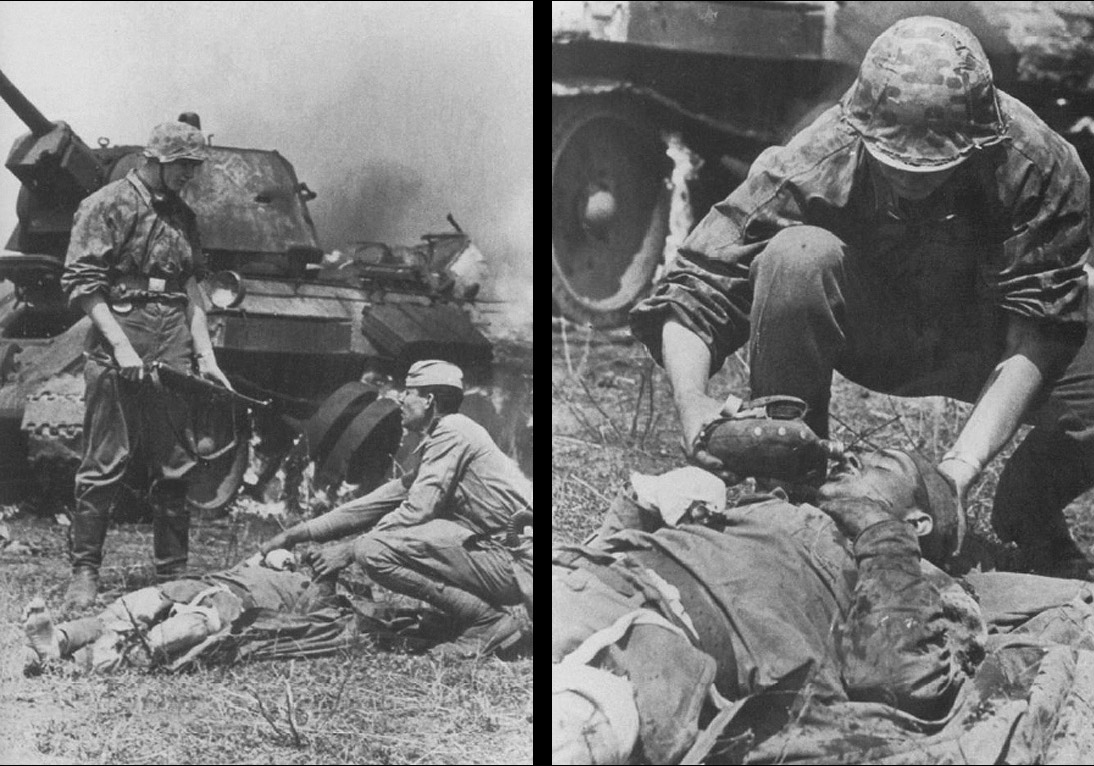
Gerhard: It was very nice for me; it was like being on a vacation from the war to be honest. It was much like a college town in those days, and we were the college students, except for we were the very elite of the SS. We would go into town and drinks and food would be deeply discounted or free. We had to watch the girls who flocked to try to break our focus. I met a young lady who worked in the town bakery and she shared a love of landscape art I found out. We would go on long walks and admire the beauty of nature. Most of the time we had no time for women, the demands of training kept us busy all the time. We had to stay in shape, so we ran, swam, and hiked all over the area. We also conducted field exercises and command and control training. You would be surprised that there was very little political talk during this time, the war drew all the focus, we only had one course on dealing with cowards, defeatists, and competitive personalities.
Our instructors were all combat veterans and from different divisions of the SS. I was able to form good relationships with many of these men, which I believe kept me alive. After graduation as an SS Untersturmführer, I was sent to a place in Putlos [Germany] for Panzer school.
After finishing here, I was given a chance to stay on as an instructor in Panzer training, being kept from the front. I was on the home front all of 1942 and 1943 training. It was not until May 1944 that I was released and sent to the Panzer regiment of the Leibstandarte, just in time for Normandy.
What was it like to fight in Normandy?
Gerhard: It was a very hard fight to be blunt; we were outnumbered and over matched. We came under attack even before we reached the front. We had to move from Belgium to Normandy and the Allies were everywhere it seemed. They brought in teams to mine and sabotage roads and bridges. The sky was theirs and had to be watched constantly. Some of the French offered us water on our way as it was hot.
I remember not all the French thought of them as liberators, they thought they would allow Stalin to have free reign in Europe. The Allies also bombed many parts of France, killing many civilians, which turned them against the supposed good guys.
Our Panzer regiment was put by the area of Caen, and I was able to see the Tiger and Panther in action. I saw Michael Wittmann after his exploit at Villers-Bocage [The Battle of Villers-Bocage took place on June 13, 1944, one week after the Normandy Landings], where we were placed.
Our company was able to wreak havoc on the British, and I saw my first prisoners, a mix of American, British, and Canadians. The Hitler Jugend Division mostly took on the Canadians and was on our flank. Sepp Dietrich was among us as well and often stopped to talk about our morale and battles.
I can remember too that food was scarce some days as our supply lines were often attacked and destroyed. The French who did not retreat took care of us and fed us, some quiet days we had good dinners with the locals. I felt for the many civilians who stayed put. You would see them trying to move out of a battle zone right when the fighting started. This resulted in some dead and wounded, which we treated.
We were overwhelmed in the end because we were vastly outnumbered by the enemy and forced to retreat. We held open a narrow route and beat back heavy armor attacks. They got us once, around a place called Chambois, but we broke their ring and caused heavy losses. The Americans were the enemy here and closely stayed on us.
Our commander had been [Joachim] Peiper for most of Normandy, but he fell sick due to bad food or water and was sent to a hospital. He sent his greetings to us for a brave retreat and for not showing the enemy our backs. I was in wounded in the end, which put me back in the hospital again.
[Above: Gerhard Stiller.]
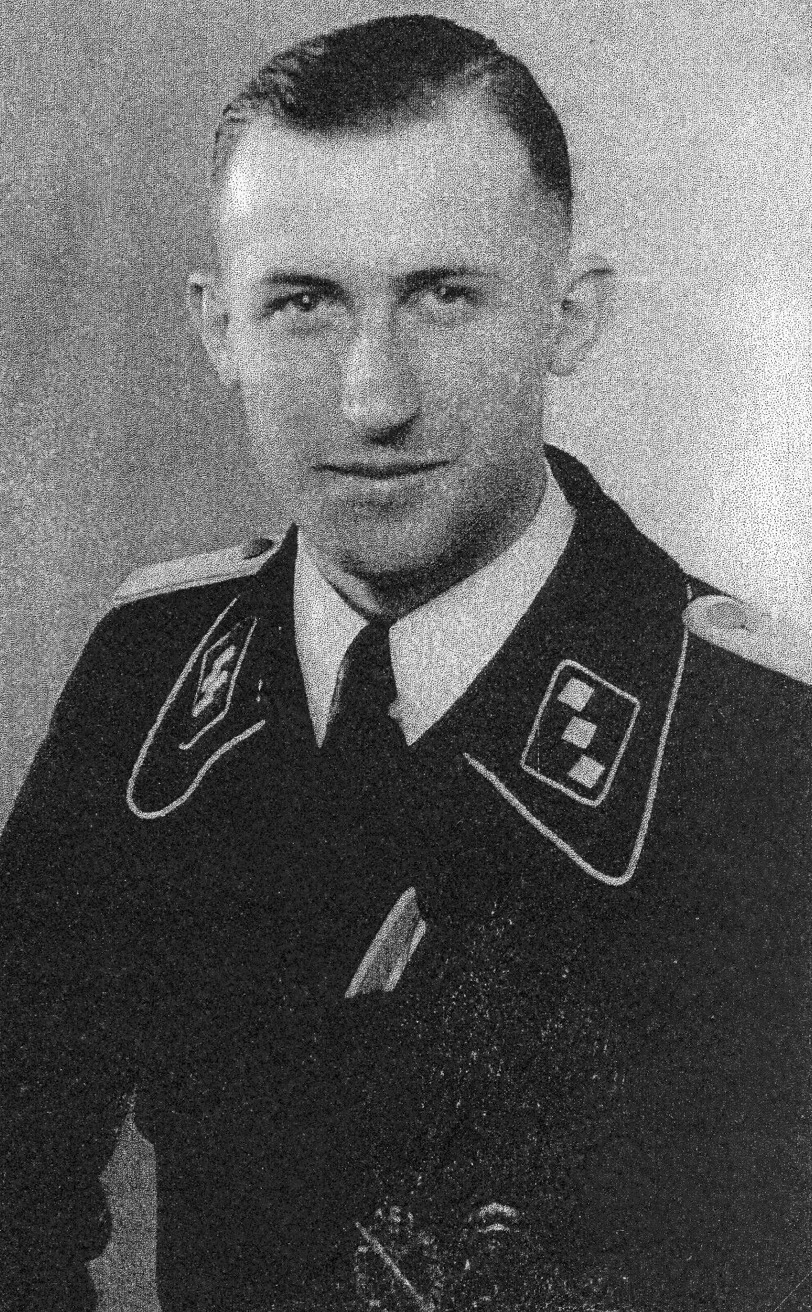
Gerhard: Look, we lost the war; we were beaten by a vastly numerically superior foe, which chose to portray us as an evil force out to take over the world. They say we killed prisoners, Jews, and civilians without a moral thought. Take it from someone who was there, I never saw or heard of any actions that would have made these accusations true. I was a medic in the LSSAH and I can tell you I treated enemy soldiers and civilians alike, even partisan fighters. We had orders and training that made it clear we were at war with a hard enemy, but we must remain humane. We bore the Führer's name and must never bring dishonor to him. Of course this is why the Allies accuse us of these things; we bore his name, so we shared in his 'evil', so they say. I can say I honestly do not believe in any of the stories being told today, and they only seem to grow in absurdity. We treated the Russians well, and they were fair to us. Some men even had girlfriends just to tell you how it was.
You knew there were of course differences between our peoples; this is a fact of nature but it did not cause hate. We knew the Pole and the Russian were behind us in culture and advancement, but not by much. As I said we got along well with the populations and stayed in Russian towns or villages during pauses.
As I was wounded and was traveling back to Germany from the east, I saw our Red Cross and RAD [Reichsarbeitsdienst, or Reich Labor Service] helping rebuild what Stalin destroyed. This does not fit the story that we came to enslave and kill them, does it? I treated many American soldiers who were wounded, never once did I hear "shoot them", never.
All prisoners, both in the east and west, were treated as soldiers and given respect. I don't know how many times I saw our men give cigarettes and food to Russians. We have nothing to be ashamed of, except losing a war we were forced into. The treatment we endured at the end is a crime in itself and someday must be told.
How were you treated?
Gerhard: We were kept in outdoor enclosures with no food or care. We had many men who caught dysentery and defecated all over where we slept. When it rained it ran onto everyone, the Americans did nothing but laugh at us. I hate to remember those days, as I think of my comrades who survived the war, only to die in internment.
I say this not to detract from your question, but you must know how we were treated, because they thought we were the 'master race'. I don't know how many of our soldiers died after the war, but in my camp, for the 3 months we were there, over five hundred perished due to sickness and malnourishment.
Then they moved us to better locations, but then came the mental abuse we had to endure. They would call us Aryan supermen and often make fun of something about us. We had to attend hours of films and speeches telling us how wrong and evil it had all been. They would act so morally superior to us, all while having armed guards.
Anyone who made a retort or disagreed was quickly removed and sent on to other camps for hardened offenders. I remember those videos of all the dead bodies in the camps, they even showed Dresden, claiming it was Jews. We knew what really happened; the Allies caused these deaths mostly by choking off our supply lines. Shit, Germans were even dying at this stage of the war.
Those coming from the east had to walk a very long way, with very little food and medicine, quickly became ill and spread it to others. The same in the camps where that girl Anne Frank died, the Allies did that. We felt a certain shame that it happened under our watch, but it could not be helped, they were considered enemies of the state, and/or criminals.
We knew these things were not done deliberately to cause their deaths, but we still felt bad for them. I would see many come and go who looked very healthy and fit, wearing the striped uniform. The ones who got sick and died did so because the Allies caused it, you see.
You learned to just agree with them and let it go; we only wanted to get home to our families. Arguing about the supposed crimes of the regime or SS was a waste of time; it would only get you in trouble so we never did it. We just smiled and said we had no idea it was happening, but are ashamed it did.
I will share a secret with you I do not tell anyone, I saw Belsen in 1942 and it was a very clean camp with happy prisoners who were healthy and not mistreated. I went for training on treating Russian prisoners, and this camp had many. I also saw Dachau on a day when some inmates were released who completed their punishment, there was nothing bad going on there. What they say today is simply not the correct picture, but we must not discuss this or we get in trouble.
[Above: Two photos of Gerhard Stiller.]
[Above: An aged Gerhard Stiller.]
